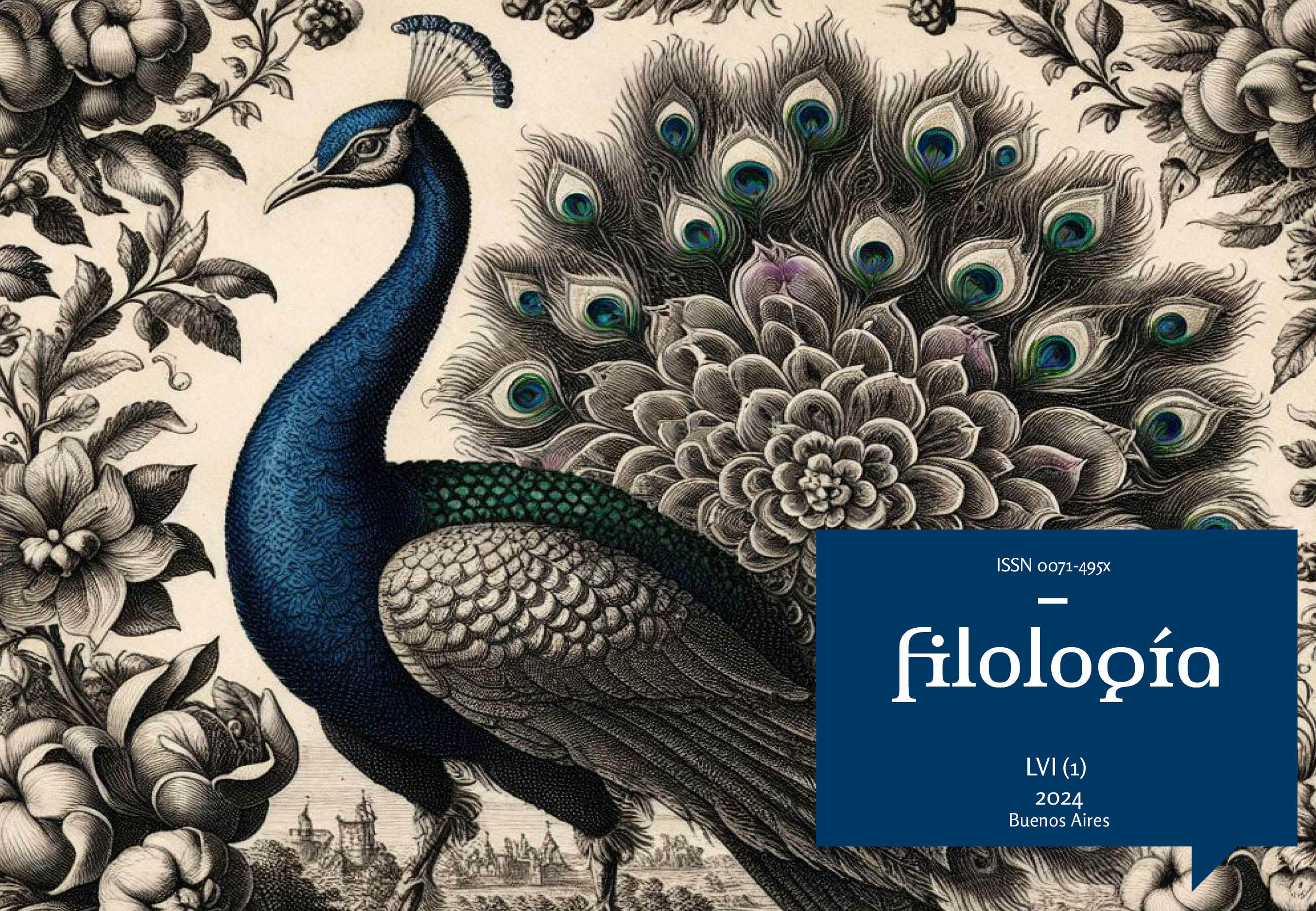Las The Cuir Writings of the Self as a [Neo]Baroque Braid. Individual Subject, Collective Subjectivities and Impersonality of the Living
Abstract
The article intends to read the texts by Marlene Wayar, Furia Travesti, and Camila Sosa Villada, Las malas and Soy una tonta por quererte, from a perspective that deviates from the canonical reading pacts. The accent will therefore be placed on the way in which the texts respond to the question “Who am I?” and, at the same time, “Who are we?”, based on a conception of decentered, mutant, non-binary and becoming subjectivity that also unfolds as an unformed-form of the living. Thus, due to the characteristic estrangement effect of anamorphosis, one of the forms that biopoetic criticism can assume, what appears to be a dictionary can be conceived as an autobiography that braids the individual, the collective and the impersonal. Moreover, what is presented as a novel or collection of short stories focused on the figure of a ghostly self that appears and disappears in the text, can be considered a fantastic autofiction in which individual subjectivity is dispersed and multiplied in stories of fabulous beings that define an unformed-form of animal life. The work postulates that queer self-writings, in this case transvestite figurations, display their ambivalences and contradictions as an act of political dissidence in which a textual process of denaturation occurs that puts in crisis the meaning that editorial paratexts and metatexts (prologues, interviews with the author) try to impose.Downloads
References
Ahmed, S. (2015). La política cultural de las emociones. UNAM.
Alberca, M. (2013). El pacto ambiguo. De la novela autobiográfica a la autoficción. Biblioteca nueva.
Baltrušaitis, J. (1996). Les perspectives dépravées. Flammarion.
Borges, J. L. (1974). Obras completas. EMECÉ.
Brea, J. L. (1991). Nuevas estrategias alegóricas. Tecnos.
Butler, J. (2002). Cuerpos que importan. Sobre los límites materiales y discursivos del sexo. Paidós.
Colonna, V. (2004). Autofictions & autres mythomanies littéraires. Tristram.
Deleuze, G. y Guattari, F. (1994). Mil mesetas. Rizoma. Capitalismo y esquizofrenia. Pre-textos.
Deleuze, G. (1988). El pliegue. Leibniz y el barroco. Paidós.
Derrida, J. (1980). Le loi du genre. Glyph, 7(1), 176-201.
Derrida, J. (2008). El animal que luego estoy si[gui]endo. Editorial Trotta.
Esposito, R. (2011a). Bíos. Biopolítica y filosofía. Amorrortu.
Esposito, R. (2011b). El dispositivo de la persona. Amorrortu.
Foucault, M. (1994). El cuerpo utópico. Las heterotopías. Nueva Visión.
Giorgi, G. (2014). Formas comunes. Eterna Cadencia Editora.
Jay, M. (1993). Campos de fuerza. Entre la historia intelectual y la crítica cultural. Paidós.
Lemebel, P. (2008). Serenata Cafiola. Seix Barral.
Lejeune, P. (1975). Le pacte autobiographique. Seuil.
López de Gomara, F. (2003). La historia general de Las Indias. Biblioteca Virtual Universal. https://biblioteca.org.ar/libros/6339.htm
Lorenzón, C. (2022). Marlene Wayar: “Las travestis ponemos en duda el mundo establecido, desde el más absoluto despoder”. Télam digital. https://www.telam.com.ar/notas/202201/579690-marlene-wayar-diccionario-travesti.html
Mateo del Pino, A. (2019). QUEER/CUIR - CRIP. Anclajes, 23(3), 1-9.
Mignolo, W. (2017). Prefacio. En P. P. Gómez (Comp.), Arte y estética en la encrucijada descolonial II (pp. 7-8). Ediciones del Signo.
Montes, A. (2013). Políticas y estéticas de representación de la experiencia urbana en la crónica contemporánea. Corregidor.
Musitano, J. (2017). Ruinas de la memoria. Autoficción y melancolía en la narrativa de Fernando Vallejo. Beatriz Viterbo Editora.
Palmeiro, C. (2011). Desbunde y felicidad. De la Cartonera a Perlongher. Título.
Pardini, M. (2022). Marlene Wayar, la literatura y el mundo trans: “El arte es una puerta que se nos abre para lograr un impacto en la sociedad”. Revista Leemos. https://www.revistaleemos.com/marlene-wayar-la-literatura-y-el-mundo-trans-el-arte-es-una-puerta-que-se-nos-abre-para-lograr-un-impacto-en-la-sociedad/
Percia, M. (2014). Sujeto fabulado I. Notas. La cebra.
Perlongher, N. (2004). Papeles insumisos. Santiago Arcos.
Preciado, B. (2012). «Queer»: historia de una palabra. Las disidentes. https://lasdisidentes.com/2012/08/21/queer-historia-de-una-palabra-por-beatriz-preciado/
Quintana, I. (2022). Arte, afecto y concepto en la teoría travesti trans latinoamericana de Marlene Wayar. Revista de estudios y políticas de género, 7, 100-121.
Rancière, J. (2010). El espectador emancipado. El Zorzal.
Robert Moraes, E. (2017). O corpo impossível. Iluminuras.
Sarduy, S. (1974). Barroco. Sudamericana.
Segarra, M. (2022). Humanimales. Abrir las fronteras de lo humano. Galaxia Gutemberg.
Scasserra, J. I. (2021). ¿Qué es lo cuir? ¿Nos define con quién nos acostamos? Vice. https://www.vice.com/es/article/k78kkz/que-es-lo-cuir-nos-define-con-quien-nos-acostamos
Soich, M. (2023). Cuando “teoría” se escribe con T de trans. [Reseña de Una teoría lo suficientemente buena, de Marlene Wayar, Travesti]. Ideas. Revista de filosofía moderna y contemporánea, 10, 177–189.
Sosa Villada, C. (2022). Soy una tonta por quererte. Tusquets.
Sosa Villada, C. (2019). Las malas. Tusquets, “Rara Avis”.
Televisión Pública Noticias (2019, 30 de enero). Inclusión laboral trans: el legado de Diana Sacayán [Video]. YouTube. https://www.youtube.com/watch?v=djpr_WZ8gwE.
WWayar, M. (2019). Una teoría lo suficientemente buena. Editorial Muchas nueces.
Wayar, M. (2021). Furia travesti. Diccionario de la T a la T. Paidós.
Yelin, J. (2020). Biopoéticas para las biopolíticas. El pensamiento literario latinoamericano frente a la cuestión animal. Latin America Research Commons.
Copyright (c) 2024 Alicia Montes

This work is licensed under a Creative Commons Attribution-ShareAlike 4.0 International License.














